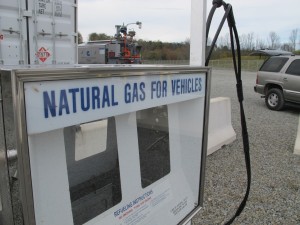On oil embargo’s 40th anniversary, has shale drilling changed the game?
-
Katie Colaneri

MARIE CUSICK/STATEIMPACT PENNSYLVANIA
A Cabot Oil& Gas compressed natural gas fueling station in Susquehanna County, Pa.
Speaking to a ballroom packed with members of the natural gas industry at a conference in Philadelphia last month, Lt. Governor Jim Cawley recalled with disdain the days of waiting on gas lines to fill up cars, trucks, and lawn mowers. Some members of the audience nodded along, perhaps stirred by their own memories of 1973.
Then, Cawley told them those days could be over thanks to the Marcellus Shale which he called “an inevitable threat to the Saudi economy.”
Today, October 17, marks the 40th anniversary of the Arab oil embargo and the birth of “energy independence” to the national rhetoric. Richard Nixon was the first president to make that promise to the American people. Now, the combination of horizontal drilling and hydraulic fracturing in shale formations like the Marcellus and the Bakken is touted by politicians like Pennsylvania’s Governor Tom Corbett and President Barack Obama as the key to eliminating our dependence on foreign oil.
StateImpact Pennsylvania has reported that some analysts watching the business believe energy independence is more a campaign promise than a realistic goal. But as the U.S. is poised to become the number one oil and gas producer in the world this year, the Washington Posts reports there are some striking parallels from 1973 to today.
More from the Washington Post (including an Associated Press file photo from a gas station in Perkasie, Bucks County):
Even with the surge in domestic oil production over the past five years, the United States imports more than a third of its oil — down from about 60 percent in the middle of the past decade but about the same proportion as 40 years ago. And because the economy has grown, we import 2.6 times as much oil as we did in 1973.
Moreover, we pay dearly for it, which was one of OPEC’s objectives. The inflation-adjusted price of crude oil now is more than twice as high as it was after the five-month embargo, and money continues to flood the coffers of oil-exporting countries. With consumption surging in China, India and the Middle East itself, oil markets are tight, with little spare capacity.
However, the Washington Post also reports that there are some big differences 40 years later like the domestic development of shale gas as well as the impacts and even the notion of climate change.
Even if oil were plentiful and cheap, climatologists warn that the continued burning of fossil fuels will have disastrous consequences for the climate, something never considered in the 1970s.
As long as we are burning fossil fuels, though, U.S. domestic oil production matters. It peaked in 1970 at 9.6 million barrels a day , slumped to 5 million barrels a day in 2008 and has now rebounded to 7.5 million barrels a day. The revolution in shale drilling — a combination of horizontal drilling and hydraulic fracturing known as fracking — has also helped keep the U.S. economy from being at the mercy of events in the Middle East. The oil shocks of the 1970s also led to the boom in ethanol, which today displaces about 580,000 barrels a day of crude oil.
The 2.5 million-barrel-a-day increase in U.S. supplies over the past five years has given the United States greater leeway in its foreign policy and made the country less susceptible to energy manipulation. Without this ramp-up in supplies, “we would not have been able to carry out sanctions on Iran,” says consultant and historian Daniel Yergin, vice chairman of IHS and the author of “The Quest: Energy, Security, and the Remaking of the Modern World.” Those sanctions have helped change the tone of Iranian officials recently, though they have yet to shift Iran’s position on its nuclear development program. Without the shale drilling revolution, Yergin says, “there would be a lot of hand-wringing about how we compare” to the 1973 embargo.
















